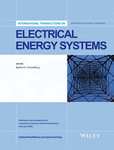Dynamic economic emission dispatch using modified NSGA-II
Summary
The dynamic economic emission dispatch (DEED) of power system occupies a decisive position in the process of energy conservation and emissions reduction. DEED incorporating valve point effect of generator units is a dynamic multi-objective non-convex optimization problem with the characteristic of nonlinearity, strong-constraint, and multi-peak. This paper proposed a new modified non-dominated sorting genetic Algorithm-II with selection based on dynamic crowding distance and new controlled elitism to solve DEED, which can guarantee the diversity of population under the premise of elitism of population. A deep analysis about blocked evolution produced by heuristic operation which is used to handle the complicate constraints is executed, and a modified heuristic operation based on forward search operator has been firstly implemented to solve the problem. A new membership function has been defined to describe the superiority–inferiority of the individuals in the Pareto set, from which the best compromise solution is selected. Finally, case studies were carried out with the classic 10-units test system. The simulation results demonstrate the better global search and better results acquirement capability of the proposed modified non-dominated sorting genetic Algorithm-II comparing with existing non-dominated sorting genetic Algorithm-II. Copyright © 2016 John Wiley & Sons, Ltd.




